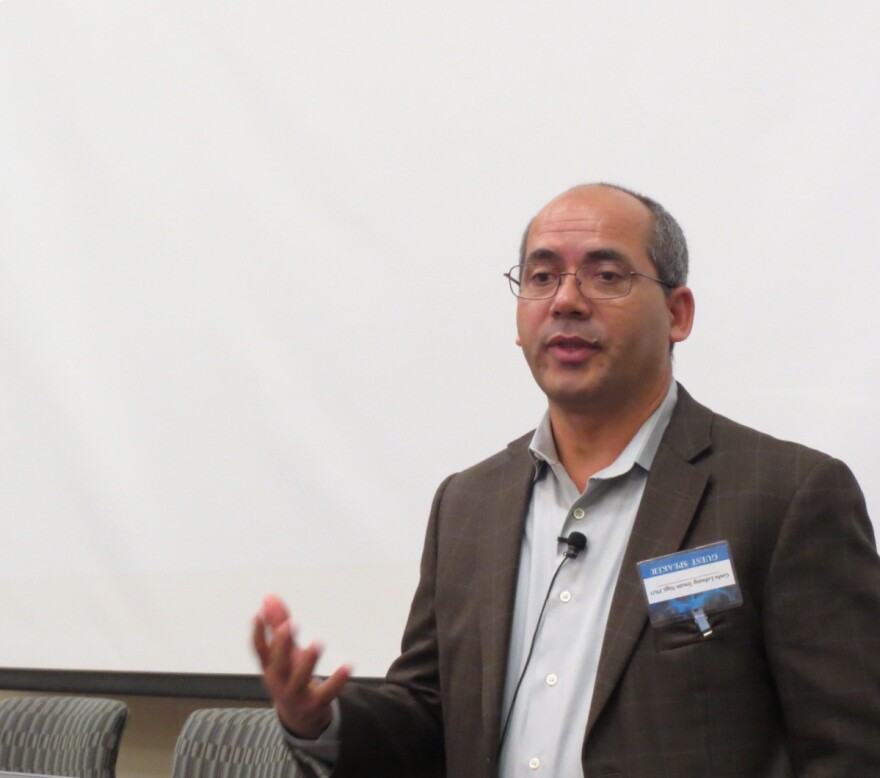Hospitals and medical schools in Peoria and nationwide are beginning to address an issue that’s ailing the healthcare industry. Rates of physician burnout, depression and suicide are markedly higher than the general population.
Experts estimate between 300-400 physicians kill themselves annually in the US. National statistics on depression among medical students and residents are also concerning, at about 30 percent.
Physicians who suffer feelings of burnout and depression provide less quality care for their patients. That’s according to the latest research, which also finds that doctors’ ability to empathize directly impacts patient outcomes.
Bento Soares saw that correlation play out in a deeply personal case.
“I was married for 25 years, and I lost my wife to cancer, and it was a very aggressive cancer that took her life in 14 months,” Soares said.
As those months progressed, Soares witnessed firsthand how even the most experienced and caring physicians can struggle. In particular, he says, the transition from when a drug can still be offered, to the point where treatment is no longer possible.
“And at the time when you most need, you want that person to remain involved, to remain present,” Soares said.
Soares is Senior Associate Dean for Research and heads the department of Cancer Biology and Pharmacology at the University of Illinois College of Medicine in Peoria. From that perspective, Soares says, he understands why doctors may cut off emotions in an act of self-preservation. But the research has revealed that response is neither helpful for the provider, nor for the patient.

“We have been predominantly concerned with the technical skills and the knowledge that are required for the practice of medicine," Soares said. "But we forget that there’s an individual that’s delivering that.”
Bento Soares is proposing a solution that requires a new mindset.
Meditation.
Soares is leading an effort to bring Cognitively-Based Compassion Training to the medical school and expand it to other institutions in Peoria. A CBCT meditation session begins as you might expect...
Recording: “Focus on the sensation of breathing, for five cycles…”
A meditation instructor’s voice guides listeners into a relaxed state, starting with physical aspects, like posture and breath. Then it progresses to the mind, instructing the listener to ‘witness’ their thoughts.
Recording: “As they unfold in the present moment...without becoming entangled.”
The CBCT philosophy is, essentially, that while pain is an inevitable part of being human, people have the ability to harness their emotions and control how they relate to suffering.
“Compassion is a skill that can be trained, you get better, like language. We all come with a predisposition for certain skills and abilities, but through the training we can get better,” Emory Professor Lobsang Negi said, during a presentation on mindfulness at UICOMP in April.
Negi, who’s also a former Buddhist monk, developed the CBCT method at Emory, in response to the alarming rates of depression and anxiety among medical students.
He says holding onto negative thoughts manifests as anxiety and depression, which can escalate, leading to destructive behaviors like drug abuse or suicide.
“It gets buried, denied. Your brain doesn’t work that way. It becomes too much. It needs some kind of outlet,” Negi said.

Five UICOMP instructors are completing the certification in Negi’s research-backed protocol. So they’ll be able to offer CBCT to incoming medical students, residents and faculty.
But to get better, there has to be a willingness.
Doctors are notoriously reluctant to seek mental health treatment, sometimes out of time constraints but also because of the competitive nature of the health-driven profession.
“Sometimes the traumas are so dramatic, it just takes its toll on you, and now, the literature is really clear that you need to recognize that toll, and it needs to be recharged somehow,” Dr. Tim Vega, director of Health Management and Ambulatory Physician Services at OSF Healthcare, said.
Vega is spearheading a separate initiative called "Clinician Care" that connects providers, including nurses and physician’s assistants, to wellness workshops and counseling.
“Part of this is a service to providers, but in reality, it’s a service to patients, to maximize the care that they are getting," Vega said. "If it’s your family, if it’s you...you want that provider to be fully attentive to what’s going on for you. And that’s what it’s all about.”
Part of the cultural shift playing out in hospitals comes from to mounting studies and awareness about the prevalence of physician burnout.
Dr. Vega thinks there’s another force driving the change.
“I think it was a generational thing, and the millennials saying, ‘there’s more to life than driving a career, and driving it to death.,” Vega said.
Which is the heart of the mindfulness and compassion training being taught at the U of I College of Medicine this fall. The program aims to help people develop feelings of empathy and compassion toward themselves and others, in this case physicians and their patients. Soares says the hope is that doctors will harness those emotions to strengthen their desire to relieve a patient’s pain and suffering.
“So, it’s not about suppressing. It’s about relating to it differently," Soares said. "You kind of embrace what happens, and take that as an opportunity, not a source of destruction.”
It’s something Soares knows personally, all too well. After his first wife died of cancer, he remarried. But for the second time, Soares lost his wife to cancer. He says practices similar to those taught in the Cognitively-Based Compassion Training helped him work through his agony and transform it into what he calls “an energy.”
“A motivator to guide me to do things that will help others, who inevitably, it’s just a matter of time, will face similar hardships,” Soares said.
Soares says he thinks that will ultimately bring more healing to health care providers and patients alike. He’s also working to bring CBCT to other sectors in Peoria, including schools.

